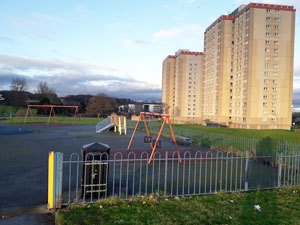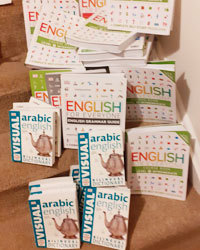CLD ESOL - Bethany Christian Trust online community
Background
 Bethany Christian Trust works in Moredun, in the South East of Edinburgh – an area marked by 6 high rise flats. Work seeks to meet local needs and build a sense of community where the potential for homelessness is a real concern.
Bethany Christian Trust works in Moredun, in the South East of Edinburgh – an area marked by 6 high rise flats. Work seeks to meet local needs and build a sense of community where the potential for homelessness is a real concern.
Many individuals and families who have English as a second language (ESOL) have been housed in Moredun. Bethany’s ‘Everyday English’ group aims to connect socially isolated women from ESOL backgrounds to enable more English learning as well as mutual support and connection. This helps to address issues around social isolation, community integration, sharing information in relation to Covid-19 as well as the community and general knowledge of life in the community.
Bethany staff lead the group with support from trained English language teaching volunteers and from group members themselves. Due to Covid-19 the group was unable to meet face to face and learning was moved online, using Zoom. This has improved benefits in areas of poverty related impact such as reducing travel costs, distance, time and the sense of community as well as connection online is growing. The group now has women from different parts of Edinburgh joining it, growing the community from one specific area to wider with people from different cultures and languages learning together.
The group is a safe space for the women to share their concerns about Coronavirus and to ask questions about rules and guidelines, health and safety, and home-schooling. One woman recently commented, “We can talk of our stresses and we talk like family”, whilst another shared, “my soul and mood are tired… and, I need to contact others”. Another says, “we are friends and people are very kind”. The importance of these local connections during lockdowns and the pandemic have supported the learners mental health and provided a local, community support network.
Bethany staff support the women beyond the weekly classes and try to work in a joined up way and in partnership with others, offering practical and relational support through phone calls, doorstep visits, walks together and food support. One woman says, “I love this group. It is not only for English. Every day I can ask for help without appointment”.
What was done
 Moving classes online, means that digital access has been a challenge, with some women no longer engaging. Bethany Christian Trust has helped provide devices for some of the women with grant funds. Supporting children’s learning, especially during lockdown, has been a huge concern for some of these parents who feel they do not have adequate English or understanding of the education system. Bethany, in partnership with Edinburgh City Council, also run an online homework club each week for the children of ESOL families, with most of the children’s mothers coming to the English class. The devices have proved to be helpful for both the women and for children doing home learning where digital poverty is a real issue.
Moving classes online, means that digital access has been a challenge, with some women no longer engaging. Bethany Christian Trust has helped provide devices for some of the women with grant funds. Supporting children’s learning, especially during lockdown, has been a huge concern for some of these parents who feel they do not have adequate English or understanding of the education system. Bethany, in partnership with Edinburgh City Council, also run an online homework club each week for the children of ESOL families, with most of the children’s mothers coming to the English class. The devices have proved to be helpful for both the women and for children doing home learning where digital poverty is a real issue.
Zoom proves to be the easiest digital platform and it can easily be used from a smart phone. Sessions are kept interactive and fun, using breakout rooms to increase the opportunity for women to speak with a volunteer. The weekly conversational sessions can be adapted to engage any language level, discussing relevant themes such as health, coronavirus and changing rules, education, children, family, our stories, food, as well as aspects of living in Scotland and understanding Scottish traditions, words and phrases.
The group has proved to be a platform for progression for some of the women. For example, several women have enrolled in Edinburgh College English courses, and one woman has been volunteering in one of Bethany Christian Trust’s charity shops, when allowed following Covid-19 guidance. She commented that the skills she is learning will be useful for a future job, such as using the cash machine, managing stock and talking with customers.
 Partnering with other agencies is key, with several women connecting into the Everyday English group via referrals from other agencies across the city. Some women in the group are part of other community activities such as a local jogging and walking group and Bethany staff participate and support activities such as these.
Partnering with other agencies is key, with several women connecting into the Everyday English group via referrals from other agencies across the city. Some women in the group are part of other community activities such as a local jogging and walking group and Bethany staff participate and support activities such as these.
Impact
In the midst of global and local restrictions, we are reminded so clearly of how important and foundational connection and communication are, and the success of the ‘Everyday English’ class goes far beyond either the physical or virtual classroom, being an invitation to build confidence, friendship, community and identity.
Improvement questions
- How am I helping adults and families to continue to engage in ESOL learning and wider opportunities?
- What support and information can I signpost adults to?
- How might the support and provision for adults need to be adapted or done differently during Covid-19?
- How can I raise awareness of the needs of adults and families during this time and ensure that their needs and voices are heard in recovery planning?
- How am I measuring the impact of new approaches and services and evolving these to suit the needs of adults and families?
